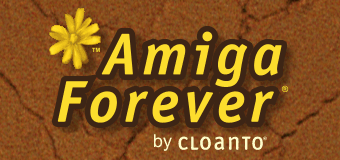A: The goal of the emulation software included with
Amiga Forever is to fully emulate the Amiga hardware, including
the original Amiga custom chips, in software. On top of this
hardware emulation Amiga Forever runs the original Amiga operating
system (not an emulation). Different versions of the Amiga
operating system are
provided for additional compatibility (e.g. some older games
require Workbench 1.3). This means that, as a general rule, all
Amiga software runs in the emulation.
Instead of publishing a "compatibility list" with would be
nothing else than a list of thousands of Amiga programs ever
released, we prefer to offer you a satisfaction guarantee: if you
are not fully satisfied with Amiga Forever you can obtain a refund
(as offered online from the Amiga Forever Homepage, third-party
vendor limitations may apply). Also, should you ever experience
compatibility issues with a specific program we would appreciate
it if you could provide appropriate feedback, so that the
emulation software and configuration can be improved.
The main limitation of the emulation software is that Amiga
hardware cannot physically be emulated on a non-Amiga computer. In
practice, this means that:
- Amiga-formatted floppy disks cannot be read without
additional hardware. This can be solved as described
here.
- Amiga hardware peripherals which require Amiga-specific
hardware interfaces (e.g. Amiga version of Video Toaster or
other Zorro-standard boards, parallel port audio devices, etc.)
cannot be attached to the PC. This can be solved by using the
corresponding PC-specific hardware. This requires specific PC
software, if not directly supported by the emulation.
- Amiga software requiring a copy protection dongle (e.g.
certain versions of Superbase and Scala) will not work, because
the dongle itself cannot be attached to the PC. This problem,
which may affect even a "real" Amiga where a dongle cannot be
used because both joystick/mouse ports are already in use, can
be solved by using the same software without copy protection,
either as provided by the publisher or using a "hacked" version
with permission of the publisher.
One of the original limitations affecting early Amiga emulation software was
that, while the original Amiga chip set (OCS) was relatively well-documented
(registers, timing, etc.), the more complex AGA chip set was also less
documented, and certain AGA-specific features could not be completely emulated.
With the evolution of Amiga emulation software, this has been largely resolved.
In Amiga Forever this is further mitigated by the inclusion of an RTG (Amiga
retargetable graphics) implementation.
Related Links


